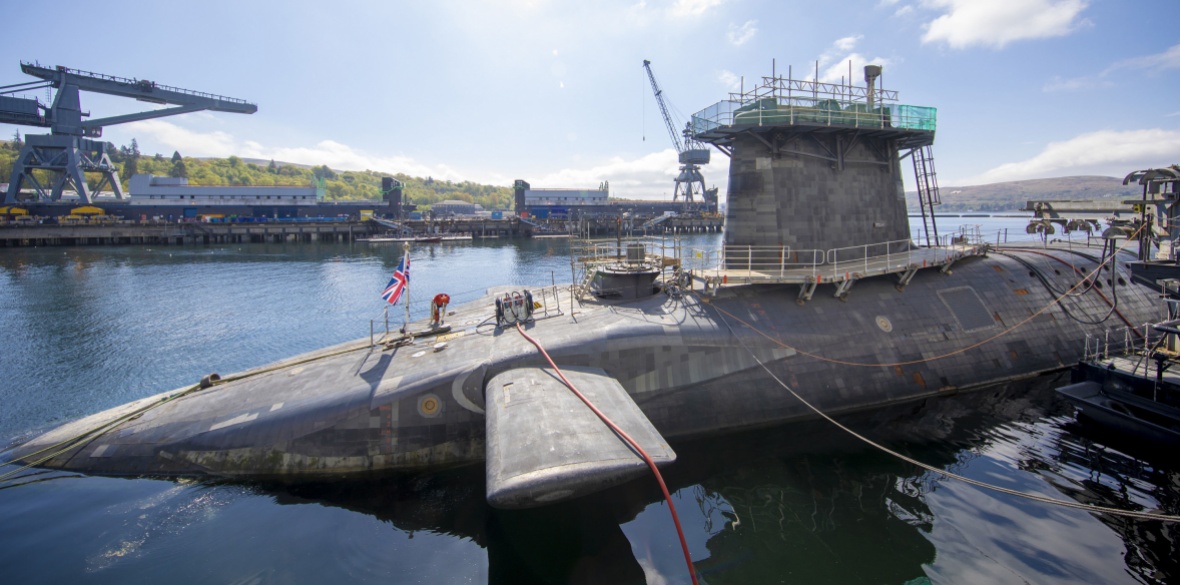This is the last article you can read this month
You can read more article this month
You can read more articles this month
Sorry your limit is up for this month
Reset on:
Please help support the Morning Star by subscribing here
THE Aukus international security agreement was signed by the Australian, British and US governments last month.
This agreement came in response to international security concerns over what are seen as aggressive Chinese policies.
The agreement was centred around a deal for the US and Britain to share their joint capabilities for building nuclear-powered (but not nuclear-armed) submarine vessels with Australia.
It has been reported that this deal includes contracting work and technology from Faslane.
The backlash to this agreement came in full force on many fronts.
In Australia there was widespread domestic criticism. A number of former prime ministers heavily criticised Scott Morrison’s decision to renege on Australia’s previous collaboration and deal with the French for their development of submarines.
It should be remembered that these French submarines would have been fuelled by conventional diesel-electric hybrid engines, rather than nuclear reactors.
Instead Prime Minister Morrison’s government opted for the US and British and nuclear-power technology.
The reaction from France was no surprise. It responded severely by withdrawing French ambassadors to the US and Australia.
Last week a meeting between respective foreign ministers from the French and the British governments was cancelled, clearly as a result of the Aukus agreement.
This episode highlights the fragility of international politics — even among supposed allies.
The theory is that diplomatic consideration should run throughout strategic policy decisions, so that such dramatic ramifications like the decline in British, Australian, US and French relations are avoided.
Offence, which can be so easily caused, is not so easily undone.
Such a misstep from the Aukus agreement — which saw Australia, the US and Britain being called backhanded and secretive — arguably could well have been avoided through better diplomacy in the forging of this agreement.
Aukus was announced without prior warning given to the French, who on that same day received a letter indicating satisfaction with military collaboration from Australia.
This offence could have be avoided or minimised, and it is unclear whether Australia’s strategic alignment with the US necessitated diplomatic difficulties with France.
Remember that France is a country that all of the three others involved share substantial ties with.
This includes the historic development of democratic systems, rule of law and social values, which are still largely shared to this day.
There will no doubt be legitimate reasons for the Aukus agreement, including a perceived need for close strategic alignment to counter specific threats.
However, if this lesson teaches us anything, it is to pick your battles.
Instead, it would surely be wise to actively pursue minimising offence, even when strategic policy decisions differ from that of other nations.
So, what do we learn from this mess? Well, as an independent nation, Scotland will have to navigate international diplomacy, making strategic policy decisions which may not fully align with allies.
France and Australia reportedly differed on their approaches to countering a threat from China. However, offence should have been avoided.
Scotland has agreed to a different strategic approach than that of the Western nuclear powers.
As an independent nation we will get rid of nuclear weapons in Scotland.
This is a decision which has been ossified in the most recent SNP conference, where I moved the motion for Scotland to join the Treaty on the Prohibition of Nuclear Weapons.
Unamended as it was, this motion confirms that an independent Scotland will, under SNP leadership, take the necessary steps to disarm within three years.
While expecting respect for our sovereign will by our neighbours and embarking on this significant process, it will be our object to build good diplomatic relations with Nato member countries and other countries which share our deeply held values of democratic institutions, rule of law and human rights.
Cultivation of strong diplomatic relationships in this context will rely on clarity, conviction, respect for our partners and an emphasis on existing shared values.
There will be voices that urge Scotland to diverge from its sovereign will and right to disarm, however we must and will stand strong to the conviction and knowledge that nuclear weapons — illegal weapons of mass destruction — are not safe for anybody.
As we take this stand, we will significantly contribute to making the world a safer place.
It is my sincere hope that through Scotland taking the leading step in disarmament of this century, it will encourage the nuclear powers to re-engage with the nuclear disarmament process they previously committed to in the United Nations Non-Proliferation Treaty and join us in making the world a safer place by the total elimination of nuclear weapons.
Bill Kidd is Scottish National Party MSP for Glasgow Anniesland.










